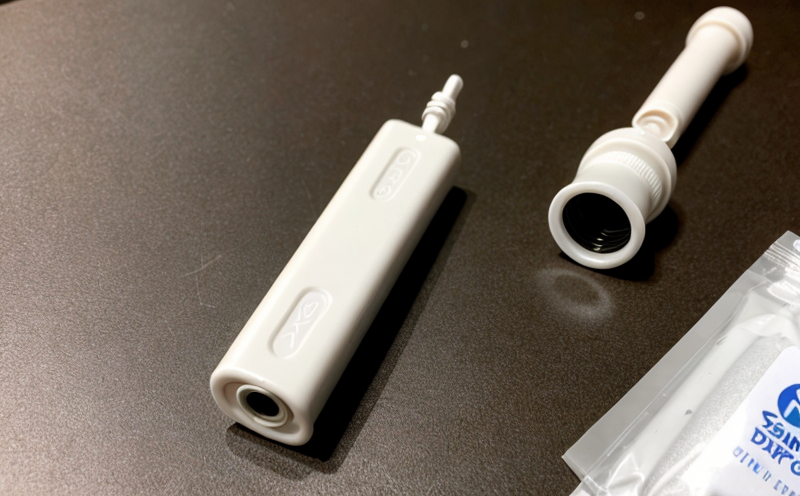Guidewire Tensile Strength Testing for Disposable Guidewires
Tensile strength testing is a critical procedure in the quality assurance and compliance of medical devices, particularly those that are disposable or single-use. Guidewires, which are slender flexible wires used to navigate through vessels during various medical procedures, require robust tensile strength to ensure they can withstand the stresses encountered during use without failure. This service focuses on testing the tensile strength of disposable guidewires using standardized methods and equipment.
The tensile strength test evaluates how well a guidewire can resist being pulled apart or broken under tension. The results provide valuable insights into the mechanical properties of the guidewire, which are essential for ensuring patient safety and device effectiveness. This service is crucial in the development, quality assurance, and regulatory compliance stages of medical devices.
The testing process involves several steps to ensure accurate and reliable results. First, the guidewires must be prepared according to specific standards. The specimens should have a consistent cross-sectional area and length to minimize variability in test results. After preparation, the guidewires are clamped into a tensile tester and subjected to increasing tension until failure occurs. The load at which failure occurs is recorded as the tensile strength.
The standard method for conducting this test typically follows ISO 5832:2017, which specifies the procedure for testing the tensile properties of metallic materials. This international standard ensures consistency and accuracy across different laboratories, providing a reliable basis for comparison and compliance with regulatory requirements.
Understanding the tensile strength of disposable guidewires is essential for several reasons. Firstly, it helps in selecting the appropriate material for manufacturing the guidewire to ensure that it can handle the forces encountered during medical procedures without breaking or bending excessively. Secondly, knowing the tensile properties allows manufacturers and quality managers to set realistic expectations regarding the performance of their devices.
Moreover, this test is a critical component of the regulatory process. Regulatory bodies such as the U.S. Food and Drug Administration (FDA) require that medical devices meet specific standards for safety and effectiveness. Compliance with these regulations not only ensures patient safety but also facilitates market access. By conducting tensile strength tests on disposable guidewires, manufacturers can demonstrate compliance with relevant standards and specifications.
The importance of this test extends beyond just ensuring the mechanical integrity of the guidewire. It also plays a role in minimizing the risk of complications during medical procedures. A guidewire that fails due to insufficient tensile strength could lead to serious consequences such as injury or even death if it breaks inside a patient's body.
Understanding the real-world implications of this test is crucial for quality managers, compliance officers, and R&D engineers involved in the development and production of medical devices. For procurement teams, knowing the expected tensile strength can help in selecting suppliers who meet these stringent requirements.
Why It Matters
The importance of tensile strength testing for disposable guidewires cannot be overstated. Ensuring that these devices meet the necessary mechanical properties is essential for patient safety and overall device performance. Inadequate tensile strength can lead to premature failure during medical procedures, potentially causing serious harm or even death.
- Ensures patient safety by preventing guidewire breakage
- Aids in selecting appropriate materials for manufacturing
- Facilitates compliance with regulatory requirements and standards
- Maintains product integrity during medical procedures
By conducting this test, manufacturers can demonstrate their commitment to quality and safety. This not only enhances the reputation of the company but also builds trust with healthcare providers and patients.
Benefits
- Ensures patient safety by reducing the risk of guidewire breakage during procedures
- Provides valuable data for selecting appropriate materials in manufacturing
- Aids in compliance with regulatory standards and requirements
- Maintains product integrity, enhancing overall performance during medical use
- Facilitates continuous quality control and improvement processes
- Supports the development of safer and more effective medical devices
The benefits of tensile strength testing extend beyond just ensuring compliance with regulations. It also helps in creating a safer healthcare environment by minimizing the risk of complications for patients.
Why Choose This Test
- Ensures product quality and patient safety
- Complies with international standards and regulatory requirements
- Provides valuable insights into material selection and performance
- Supports continuous improvement in manufacturing processes
- Maintains consistent results across different laboratories
Selecting this test for tensile strength evaluation of disposable guidewires is a wise choice for any manufacturer or quality manager. It not only ensures compliance but also enhances the reputation and reliability of the products.





